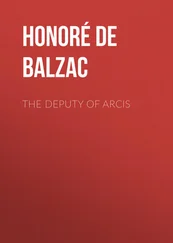“He suffers!” she said, springing up the stairs. A second moan brought her to the landing near his room. The door was ajar, she pushed it open. Charles was sleeping; his head hung over the side of the old armchair, and his hand, from which the pen had fallen, nearly touched the floor. The oppressed breathing caused by the strained posture suddenly frightened Eugenie, who entered the room hastily.
“He must be very tired,” she said to herself, glancing at a dozen letters lying sealed upon the table. She read their addresses: “To Messrs. Farry, Breilmann, & Co., carriage-makers”; “To Monsieur Buisson, tailor,” etc.
“He has been settling all his affairs, so as to leave France at once,” she thought. Her eyes fell upon two open letters. The words, “My dear Annette,” at the head of one of them, blinded her for a moment. Her heart beat fast, her feet were nailed to the floor.
“His dear Annette! He loves! he is loved! No hope! What does he say to her?”
These thoughts rushed through her head and heart. She saw the words everywhere, even on the bricks of the floor, in letters of fire.
“Resign him already? No, no! I will not read the letter. I ought to go away—What if I do read it?”
She looked at Charles, then she gently took his head and placed it against the back of the chair; he let her do so, like a child which, though asleep, knows its mother’s touch and receives, without awaking, her kisses and watchful care. Like a mother Eugenie raised the drooping hand, and like a mother she gently kissed the chestnut hair—“Dear Annette!” a demon shrieked the words in her ear.
“I am doing wrong; but I must read it, that letter,” she said. She turned away her head, for her noble sense of honor reproached her. For the first time in her life good and evil struggled together in her heart. Up to that moment she had never had to blush for any action. Passion and curiosity triumphed. As she read each sentence her heart swelled more and more, and the keen glow which filled her being as she did so, only made the joys of first love still more precious.
My dear Annette,—Nothing could ever have separated us but the
great misfortune which has now overwhelmed me, and which no human
foresight could have prevented. My father has killed himself; his
fortune and mine are irretrievably lost. I am orphaned at an age
when, through the nature of my education, I am still a child; and
yet I must lift myself as a man out of the abyss into which I am
plunged. I have just spent half the night in facing my position.
If I wish to leave France an honest man,—and there is no doubt of
that,—I have not a hundred francs of my own with which to try my
fate in the Indies or in America. Yes, my poor Anna, I must seek
my fortune in those deadly climates. Under those skies, they tell
me, I am sure to make it. As for remaining in Paris, I cannot do
so. Neither my nature nor my face are made to bear the affronts,
the neglect, the disdain shown to a ruined man, the son of a
bankrupt! Good God! think of owing two millions! I should be
killed in a duel the first week; therefore I shall not return
there. Your love—the most tender and devoted love which ever
ennobled the heart of man—cannot draw me back. Alas! my beloved,
I have no money with which to go to you, to give and receive a
last kiss from which I might derive some strength for my forlorn
enterprise.
“Poor Charles! I did well to read the letter. I have gold; I will give it to him,” thought Eugenie.
She wiped her eyes, and went on reading.
I have never thought of the miseries of poverty. If I have the
hundred louis required for the mere costs of the journey, I have
not a sou for an outfit. But no, I have not the hundred louis, not
even one louis. I don’t know that anything will be left after I
have paid my debts in Paris. If I have nothing, I shall go quietly
to Nantes and ship as a common sailor; and I will begin in the new
world like other men who have started young without a sou and
brought back the wealth of the Indies. During this long day I have
faced my future coolly. It seems more horrible for me than for
another, because I have been so petted by a mother who adored me,
so indulged by the kindest of fathers, so blessed by meeting, on
my entrance into life, with the love of an Anna! The flowers of
life are all I have ever known. Such happiness could not last.
Nevertheless, my dear Annette, I feel more courage than a careless
young man is supposed to feel,—above all a young man used to the
caressing ways of the dearest woman in all Paris, cradled in
family joys, on whom all things smiled in his home, whose wishes
were a law to his father—oh, my father! Annette, he is dead!
Well, I have thought over my position, and yours as well. I have
grown old in twenty-four hours. Dear Anna, if in order to keep me
with you in Paris you were to sacrifice your luxury, your dress,
your opera-box, we should even then not have enough for the
expenses of my extravagant ways of living. Besides, I would never
accept such sacrifices. No, we must part now and forever—
“He gives her up! Blessed Virgin! What happiness!”
Eugenie quivered with joy. Charles made a movement, and a chill of terror ran through her. Fortunately, he did not wake, and she resumed her reading.
When shall I return? I do not know. The climate of the West Indies
ages a European, so they say; especially a European who works
hard. Let us think what may happen ten years hence. In ten years
your daughter will be eighteen; she will be your companion, your
spy. To you society will be cruel, and your daughter perhaps more
cruel still. We have seen cases of the harsh social judgment and
ingratitude of daughters; let us take warning by them. Keep in the
depths of your soul, as I shall in mine, the memory of four years
of happiness, and be faithful, if you can, to the memory of your
poor friend. I cannot exact such faithfulness, because, do you
see, dear Annette, I must conform to the exigencies of my new
life; I must take a commonplace view of them and do the best I
can. Therefore I must think of marriage, which becomes one of the
necessities of my future existence; and I will admit to you that I
have found, here in Saumur, in my uncle’s house, a cousin whose
face, manners, mind, and heart would please you, and who, besides,
seems to me—
“He must have been very weary to have ceased writing to her,” thought Eugenie, as she gazed at the letter which stopped abruptly in the middle of the last sentence.
Already she defended him. How was it possible that an innocent girl should perceive the cold-heartedness evinced by this letter? To young girls religiously brought up, whose minds are ignorant and pure, all is love from the moment they set their feet within the enchanted regions of that passion. They walk there bathed in a celestial light shed from their own souls, which reflects its rays upon their lover; they color all with the flame of their own emotion and attribute to him their highest thoughts. A woman’s errors come almost always from her belief in good or her confidence in truth. In Eugenie’s simple heart the words, “My dear Annette, my loved one,” echoed like the sweetest language of love; they caressed her soul as, in childhood, the divine notes of the Venite adoremus , repeated by the organ, caressed her ear. Moreover, the tears which still lingered on the young man’s lashes gave signs of that nobility of heart by which young girls are rightly won. How could she know that Charles, though he loved his father and mourned him truly, was moved far more by paternal goodness than by the goodness of his own heart? Monsieur and Madame Guillaume Grandet, by gratifying every fancy of their son, and lavishing upon him the pleasures of a large fortune, had kept him from making the horrible calculations of which so many sons in Paris become more or less guilty when, face to face with the enjoyments of the world, they form desires and conceive schemes which they see with bitterness must be put off or laid aside during the lifetime of their parents. The liberality of the father in this instance had shed into the heart of the son a real love, in which there was no afterthought of self-interest.
Читать дальше












